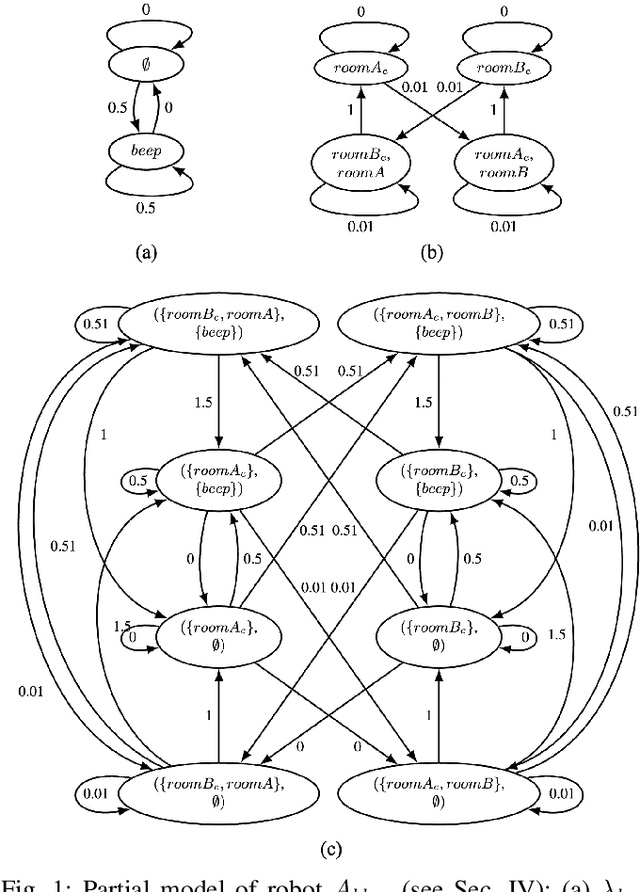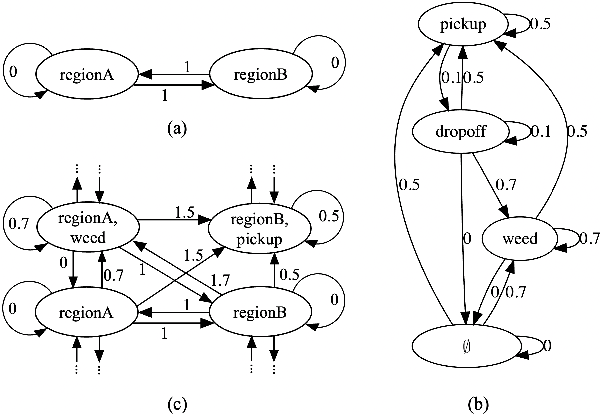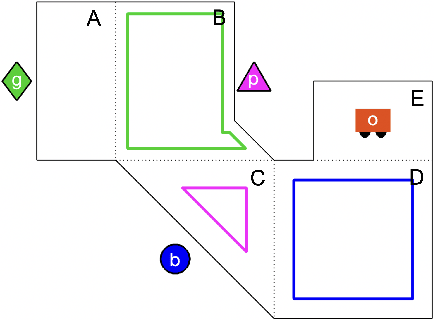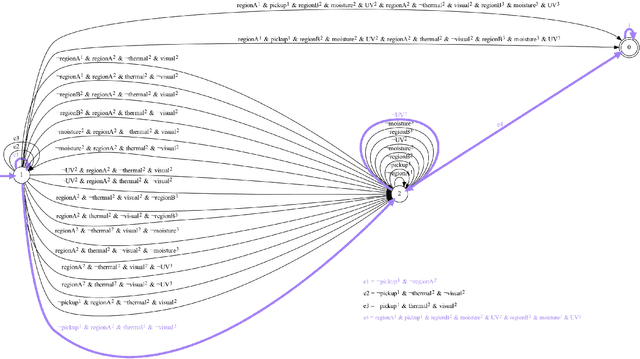Amy Fang
Online Resynthesis of High-Level Collaborative Tasks for Robots with Changing Capabilities
Sep 09, 2024Abstract:Given a collaborative high-level task and a team of heterogeneous robots and behaviors to satisfy it, this work focuses on the challenge of automatically, at runtime, adjusting the individual robot behaviors such that the task is still satisfied, when robots encounter changes to their abilities--either failures or additional actions they can perform. We consider tasks encoded in LTL^\psi and minimize global teaming reassignments (and as a result, local resynthesis) when robots' capabilities change. We also increase the expressivity of LTL^\psi by including additional types of constraints on the overall teaming assignment that the user can specify, such as the minimum number of robots required for each assignment. We demonstrate the framework in a simulated warehouse scenario.
Continuous Execution of High-Level Collaborative Tasks for Heterogeneous Robot Teams
Jun 26, 2024



Abstract:We propose a control synthesis framework for a heterogeneous multi-robot system to satisfy collaborative tasks, where actions may take varying duration of time to complete. We encode tasks using the discrete logic LTL^\psi, which uses the concept of bindings to interleave robot actions and express information about relationship between specific task requirements and robot assignments. We present a synthesis approach to automatically generate a teaming assignment and corresponding discrete behavior that is correct-by-construction for continuous execution, while also implementing synchronization policies to ensure collaborative portions of the task are satisfied. We demonstrate our approach on a physical multi-robot system.
SAM3D: Zero-Shot Semi-Automatic Segmentation in 3D Medical Images with the Segment Anything Model
May 10, 2024



Abstract:We introduce SAM3D, a new approach to semi-automatic zero-shot segmentation of 3D images building on the existing Segment Anything Model. We achieve fast and accurate segmentations in 3D images with a four-step strategy comprising: volume slicing along non-orthogonal axes, efficient prompting in 3D, slice-wise inference using the pretrained SAM, and recoposition and refinement in 3D. We evaluated SAM3D performance qualitatively on an array of imaging modalities and anatomical structures and quantify performance for specific organs in body CT and tumors in brain MRI. By enabling users to create 3D segmentations of unseen data quickly and with dramatically reduced manual input, these methods have the potential to aid surgical planning and education, diagnostic imaging, and scientific research.
High-Level, Collaborative Task Planning Grammar and Execution for Heterogeneous Agents
Feb 01, 2024



Abstract:We propose a new multi-agent task grammar to encode collaborative tasks for a team of heterogeneous agents that can have overlapping capabilities. The grammar allows users to specify the relationship between agents and parts of the task without providing explicit assignments or constraints on the number of agents required. We develop a method to automatically find a team of agents and synthesize correct-by-construction control with synchronization policies to satisfy the task. We demonstrate the scalability of our approach through simulation and compare our method to existing task grammars that encode multi-agent tasks.
Automated Task Updates of Temporal Logic Specifications for Heterogeneous Robots
Apr 18, 2022



Abstract:Given a heterogeneous group of robots executing a complex task represented in Linear Temporal Logic, and a new set of tasks for the group, we define the task update problem and propose a framework for automatically updating individual robot tasks given their respective existing tasks and capabilities. Our heuristic, token-based, conflict resolution task allocation algorithm generates a near-optimal assignment for the new task. We demonstrate the scalability of our approach through simulations of multi-robot tasks.
 Add to Chrome
Add to Chrome Add to Firefox
Add to Firefox Add to Edge
Add to Edge